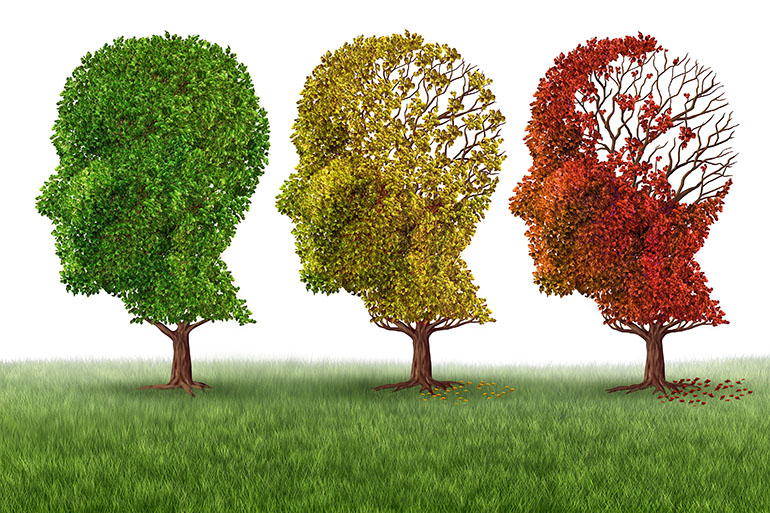In a landmark report, scientists have endorsed three strategies for preventing dementia and cognitive decline associated with normal aging — being physically active, engaging in cognitive training and controlling high blood pressure.
This is the first time experts convened by the National Academies of Sciences, Engineering and Medicine have deemed scientific evidence strong enough to suggest that preventing dementia and age-related cognitive decline might be possible.
Seven years ago, in a separate report issued by the Agency for Healthcare Research and Quality, scientists said they couldn’t recommend any interventions to forestall or slow cognitive deterioration because state-of-the-art science at that time didn’t offer enough support.
Now there’s a considerably larger body of research to draw upon. And while findings are still far from definitive, “we found encouraging evidence that supports the value of several interventions,” said Story Landis, vice chair of the 17-member panel that prepared the report and director emeritus of the National Institute of Neurological Disorders and Stroke.
 NAVIGATING AGING
NAVIGATING AGINGThat doesn’t mean the strategies are guaranteed to protect brain health. “You can do everything right and still get dementia in later life,” said Dr. Kenneth Langa, a panel member and professor of internal medicine, gerontology and health management and policy at the University of Michigan School of Public Health.
Nor does it mean these are the only interventions that offer promise. Managing depression, controlling diabetes and high cholesterol, engaging in social activities, getting adequate sleep, eating a healthful diet, taking disease-modifying treatments for dementia (if and when they become available) and getting enough vitamin B12 and folic acid also appear worthwhile, though more research is needed before those tactics can be formally recommended, the NAS report said.
Addressing lifestyle factors that raise the risk of cognitive impairment could help prevent more than one-third of dementia cases across the globe, according to a separate comprehensive analysis published in The Lancet on Thursday.
The NAS panel proposed that its findings be shared with the public and physicians, but stopped short of proposing a major public health campaign, citing the need for further research.
Here are insights from the report, based on interviews with panel members and outside experts:
Strategies Work In Some Cases, Not Others
As people age, mental processing becomes slower and memory becomes less reliable — a normal condition known as age-related cognitive decline.
Two of the interventions recommended in the NAS report — cognitive training and physical activity — appear to have the potential to delay age-related cognitive decline. But there’s no evidence that they can prevent dementia or mild cognitive impairment, an intermediate condition that sometimes progresses to dementia.
Managing high blood pressure is the only strategy thought to have the potential to prevent or delay the onset of Alzheimer’s disease. But it wasn’t shown to have an impact on age-related cognitive decline.
Once the hallmarks of Alzheimer’s are detected — notably amyloid beta plaques and tau tangles in the brain — some interventions might not be effective, said Dr. Ronald Petersen, a member of the NAS panel and director of the Mayo Clinic’s Alzheimer’s Disease Research Center.
Start Early
It’s now known that biological changes associated with Alzheimer’s and related dementias begin a decade or more before any symptoms become evident. So it’s best to make recommended lifestyle changes early and sustain them over time.
“Prevention really needs to start in people who don’t show any sign of the disease — probably when people reach their 40s,” said Jeffrey Keller, director of the Institute for Dementia Research and Prevention at Louisiana State University, who was not involved in the NAS study.
Controlling high blood pressure, a strategy that helps preserve the health of blood vessels in the brain, is most effective if begun in middle age, the NAS report explained. But if you’ve reached age 65 and your blood pressure isn’t well managed, you’re still well advised to bring it under control, Landis said.
The same applies to physical activity: It’s best if you start in middle age, but becoming more active in later life is still good for your health. While it’s not yet known which type of activity is most effective, for what duration and how often it should be pursued for maximum brain benefit, walking briskly for 150 minutes a week or about 20 minutes a day is a good idea, Petersen said.
On Cognitive Training
Probably the best cognitive training you can get is a good education and ongoing mental stimulation. “There’s growing evidence that the ways in which your brain is challenged all through your life matter,” noted Langa, whose research has documented a decline in dementia rates in high-income countries over the past 25 years.
But the impact of education on brain health is very difficult to quantify. So the NAS panel endorsed cognitive training based largely on a randomized controlled trial known as Advanced Cognitive Training for Independent and Vital Elderly, which studied several thousand older adults over the course of 10 years.
ACTIVE had certified trainers work with seniors in small group sessions on various cognitive exercises for 10 sessions lasting an hour or more over five to six weeks. Feedback was an essential part of the intervention and booster sessions were offered. At 10 years, there was evidence of a positive effect on seniors’ independence and ability to perform daily tasks.
What was responsible for this effect? The training? Social interactions? Feedback? Booster sessions? All or some of the above? It’s not yet clear.
It’s important to note that the panel insisted that commercially sold computer-based brain games can’t be assumed to have the same effect. So far, research about brain games has failed to prove that this type of training improves broad-based cognitive functioning and people’s ability to function independently.
“The data supporting their efficacy just isn’t there,” said Petersen of the Mayo Clinic.
Try Several Things, Not Just One
When scientists examine the brains of people with Alzheimer’s disease, they find amyloid beta plaques and tangles, but also changes in blood vessels, evidence of microbleeds, and lesions in the brain’s white matter. “It’s mixed dementia, due to multiple factors — not just one thing,” Landis said.
The corollary: Mix it up and try several ways to reduce age-related cognitive decline or dementia, not just one.
“If we think of Alzheimer’s as a multifactorial disease, it makes sense to reduce multiple risk factors simultaneously,” said Rong Zhang, associate professor of neurology and neurotherapeutics at University of Texas Southwestern Medical Center. Zhang is also the principal investigator for a five-year study investigating whether aerobic exercise combined with intensive control of hypertension and cholesterol can help prevent Alzheimer’s. That study, the Risk Reduction for Alzheimer’s Disease trial, is currently enrolling participants at six medical centers.
“The brain is complicated and its response to interventions is complex,” Langa said. “Therefore, the more strategies that you use to try to improve the brain’s health long term, the more likely they’re going to work.”
Don’t Bother
The NAS report found no evidence supporting the use of ginkgo biloba and vitamin E, which are widely marketed to people concerned about brain health. And it questioned the value of other supplements, noting that overall dietary patterns appear more important than any single substance.
KHN’s coverage related to aging & improving care of older adults is supported by The John A. Hartford Foundation.
We’re eager to hear from readers about questions you’d like answered, problems you’ve been having with your care and advice you need in dealing with the health care system. Visit kffhealthnews.org/columnists to submit your requests or tips.


